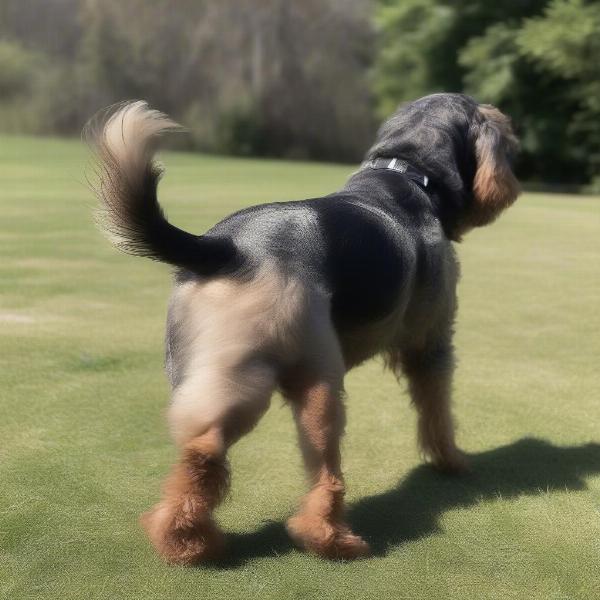If your dog keeps biting its butt, it’s a sign something is bothering them back there. While occasional butt-scooting can be normal, frequent biting and licking indicates an underlying issue that needs attention. This article will delve into the common causes of this behavior, offer practical solutions, and advise when it’s crucial to seek veterinary care.
Why Does My Dog Keep Biting Their Butt?
Several factors can contribute to a dog obsessively biting their butt. Understanding the root cause is essential for effective treatment. These range from simple hygiene issues to more complex medical conditions.
Parasites
Fleas, ticks, and tapeworms are common culprits. These parasites can irritate the skin around the anus, leading to intense itching and biting. Tapeworms, in particular, can cause irritation as segments are passed in the stool.
Anal Gland Problems
Dogs have two small sacs located on either side of the anus, called anal glands. These glands secrete a foul-smelling fluid that typically empties during defecation. If these glands become impacted or infected, they can cause significant discomfort, leading to excessive licking and biting.
Allergies
Just like humans, dogs can suffer from allergies. Environmental allergens like pollen, dust mites, and mold, as well as food allergies, can cause skin irritation and itching, particularly around the rectum.
Skin Infections
Bacterial or fungal infections can develop in the skin folds around the anus, leading to inflammation, itching, and a strong urge to lick and bite.
Hot Spots
Hot spots are moist, irritated areas of skin that can develop quickly due to excessive licking and chewing. They are often secondary to another underlying issue, such as allergies or parasites.
Solutions for a Dog Biting its Butt
Depending on the cause, several solutions can help alleviate your dog’s discomfort.
Parasite Prevention and Treatment
Regular flea and tick prevention is crucial. Consult your veterinarian about appropriate preventatives based on your dog’s lifestyle and environment. If you suspect tapeworms, a fecal examination and deworming medication are necessary.
Anal Gland Expression
If impacted anal glands are the problem, your veterinarian or a professional groomer can express them manually. In some cases, recurrent impaction may require more frequent expressions or even surgical removal.
Allergy Management
Identifying and avoiding allergens is key to managing allergies. Your veterinarian can perform allergy testing to pinpoint specific triggers. Medications, such as antihistamines or steroids, may also be necessary to control itching and inflammation.
Skin Infection Treatment
Bacterial or fungal skin infections require veterinary attention. Your veterinarian will prescribe appropriate medications, such as antibiotics or antifungals, to clear up the infection.
When to See a Vet
While some causes of butt biting can be managed at home, others require professional veterinary care. Consult your veterinarian if your dog’s butt biting:
- Is persistent or worsening
- Is accompanied by other symptoms, such as scooting, excessive licking, or changes in stool
- Involves bleeding, discharge, or a foul odor
- Causes your dog significant distress
Preventing Butt Biting in Dogs
Maintaining good hygiene can help prevent many of the issues that lead to butt biting. Regular grooming, including cleaning the area around the anus, can help reduce the risk of infection and irritation. A balanced diet and regular exercise can also contribute to overall skin and coat health.
 Dog with a healthy butt after treatment
Dog with a healthy butt after treatment
Conclusion
A dog persistently biting its butt is a clear sign that something is amiss. Addressing the underlying cause is crucial for resolving the issue and ensuring your furry friend’s comfort. By understanding the potential causes and solutions discussed in this article, you can take appropriate steps to alleviate your dog’s discomfort and prevent future occurrences. Remember, if you’re unsure or concerned, consulting a veterinarian is always the best course of action.
FAQ
- Why is my dog suddenly biting its butt? Sudden onset could indicate a new allergy, parasite infestation, or anal gland issue.
- How can I stop my dog from licking its butt raw? Address the underlying cause. An Elizabethan collar can prevent further licking while the area heals.
- Is butt biting a sign of worms in dogs? Yes, especially tapeworms.
- Can stress cause a dog to bite its butt? While stress can sometimes manifest in skin issues, butt biting is more likely due to a physical cause.
- What home remedies can I use for my dog’s itchy butt? Consult your vet before trying any home remedies. Improper treatment can worsen the condition.
- How often should a dog’s anal glands be expressed? Typically, they empty naturally during defecation. If they become impacted, consult your vet.
- Can changing my dog’s food help with butt biting? Yes, if the underlying cause is a food allergy.
cow print dog collar
leopard print dog leash
animal print dog collar
paw print dog necklace
About ILM Dog
ILM Dog (https://ilmdog.com) is your trusted international resource for expert dog care advice. We offer practical, up-to-date information on dog breeds, health, training, nutrition, grooming, and much more, catering to both novice and experienced dog owners worldwide. Whether you’re looking for help with choosing the right breed, understanding your dog’s health needs, or finding the perfect accessories, ILM Dog is here to help. Contact us today for personalized guidance: [email protected] or +44 20-3965-8624.